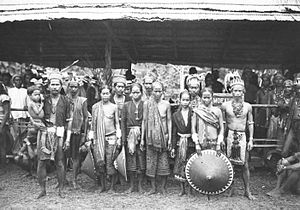|
Dayak Mualang
Mualang (also Moealang or Dayak Mualang) are an indigenous people of West Kalimantan from the Dayak group and a sub-ethnic of the Iban people.[2] They speak the Mualang language and they are mostly concentrated in areas in the Sekadau Regency and Sintang Regency of West Kalimantan, Indonesia. The specific districts where the Mualang people live include:
LanguageThe Mualang language belongs to the Ibanic languages branch along with other Ibanic dialects such as Kantuk, Bugao, Desa, Seberuang, Ketungau and Sebaruk.[3] These dialects mainly differ from one another in their pronunciations of specific phonemes. For example, words that end with "i" can be pronounced as "e" or "y" where "kediri" becomes "kedire", "rari" becomes "rare", "inai" becomes "inay", and "pulai" becomes "pulay". These words still carry the same meaning even though they are pronounced differently. These dialects also have some lexical variation between them. CultureTraditional Folk Song Traditional Dance
HandicraftReferences
Wikimedia Commons has media related to Mualang people.
|
||||||||||||||||||||||||
